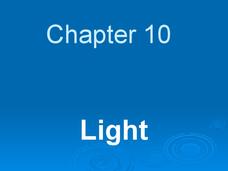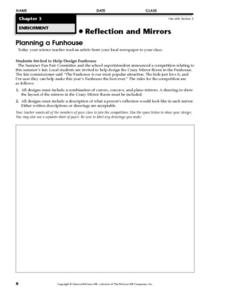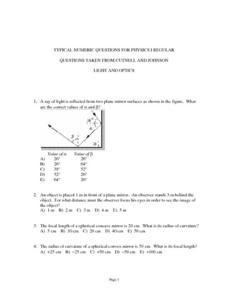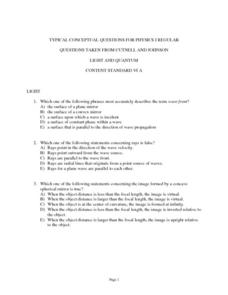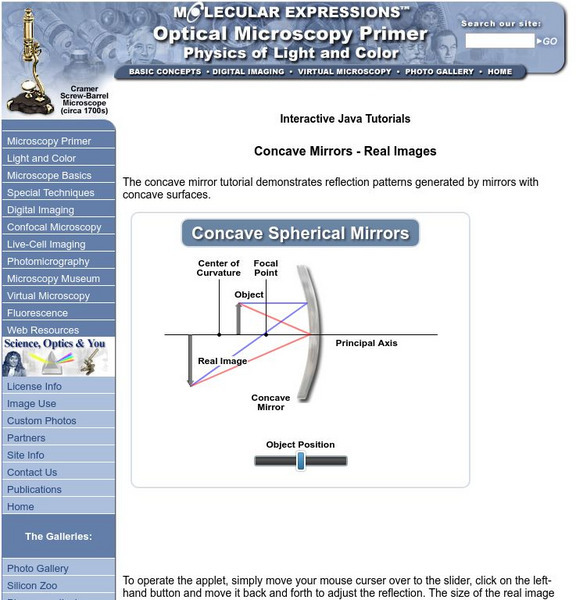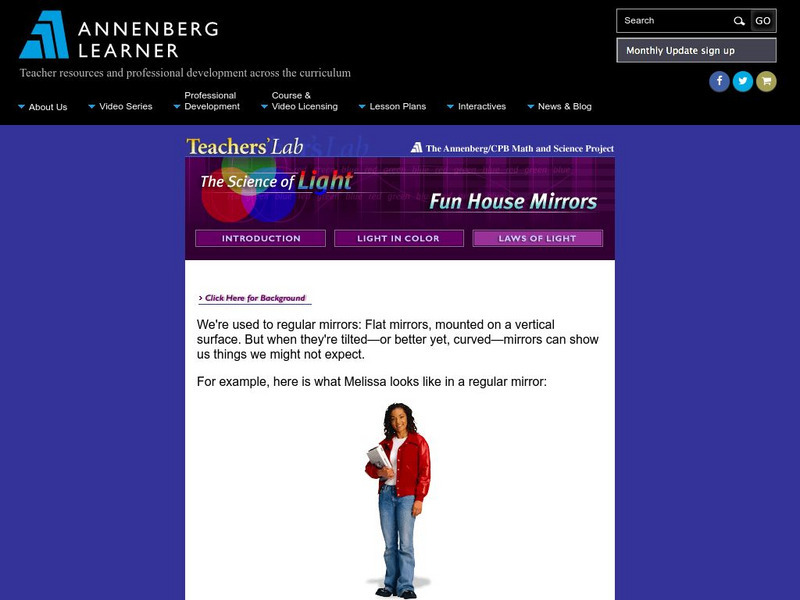Jefferson Lab
Optics: Mirrors and Lenses
Did you see that or did I imagine it? Optical illusions are often created with mirrors and lenses, and here is a presentation that covers many different types of mirrors and lenses and how they work. Flat, concave, and convex mirrors, as...
Physics Classroom
The L.O.S.T. Art of Image Description - Curved Mirrors
We see curved mirrors every day in spoons, rear-view mirrors, stores as a safety measure, make-up mirrors, and in novelty stores. Scholars explore the changes to an image based on the curve of the mirror, the location of the image, and...
Curated OER
Reflection and Mirrors
In this reflection instructional activity, students will review the law of reflection and label a diagram with its angle of incidence and angle of reflection. Then students will compare different mirror surfaces as convex or concave....
Curated OER
Light and Geometric Optics
It's time to see the light with a unit that focuses on light and geometric optics, including concave and convex mirrors. A variety of experiments, worksheets, and online activities are included.
Mr. E. Science
Light
Where does bad light end up? In a prism! The presentation covers light, mirrors, lenses, and the structure of the eye. It also provides explanations of reflection, refraction, concave and convex mirrors and lenses, and a comparison of...
Curated OER
Planning a Funhouse
In this mirrors worksheet, students will design and draw their creation of a "Crazy Mirror Room." They must use a combination of convex, concave, and plane mirrors and they must write a description of what a person's reflection would...
Curated OER
Typical Numeric Questions for Physics I - Light and Optics
Nineteen word problems dealing with frequency, speed, reflection, and refraction of light are provided here. Empower your physics masters to manipulate equations for computing angles, focal lengths, image heights, and more! This is a...
Curated OER
Typical Conceptual Questions for Physics I - Light and Quantum
This is a stellar overview of everything light and quantum! There are 30 multiple choice questions, none of them requiring any mathematical computation. There are a few diagrams to analyze: light rays striking reflective and refractive...
CK-12 Foundation
Cassegrain Telescope
How does a telescope magnify images? Learners first watch a tutorial explaining the basic construction of a telescope. Then they interact with a simulation that allows for changes in the location and diameter of the reflecting mirrors....
Curated OER
Optics- The Study of Light
In this optics activity, students read about refraction and reflection, lenses and mirrors, and objects and images. They answer 13 matching questions about light rays, light behavior and types of lenses. They also answer 9 questions such...
Cornell University
Beam Focusing Using Lenses
Explore optics using an inquiry-based experimental approach! Young scholars use a set of materials to design and build a unit capable of focusing a beam of light. They experiment with different lenses to determine the best approach to...
Cornell University
Building a Compound Light Microscope
What better way to learn how to use a microscope than building your own? A lab investigation has scholars use lenses from magnifying glasses and sheets of cork to design their own compound microscopes. They calculate focal length...
Curated OER
Microscopes, Telescopes, and Cameras
In this lenses worksheet, students will explain how microscopes work by completing 4 short answer questions. Students will compare refracting telescopes with reflecting telescopes by writing the terms given under the correct column. Then...
Curated OER
Reflection & Refraction
In this online interactive reflection and refraction worksheet, students respond to 7 multiple choice and fill in the blank questions regarding the information included in the provided paragraphs.
CK-12 Foundation
Ck 12: Concave and Convex Mirrors
[Free Registration/Login may be required to access all resource tools.] In this lesson, students learn how to draw ray diagrams and to solve problems for concave and convex mirrors.
Florida State University
Florida State University: Microscopy Primer: Concave Mirrors: Real Images
Florida State University offers an interactive Java applet demonstrating the object-image relationships for a concave mirror. The position of the object can be dragged along the principal axis and the location, orientation, and size of...
Physics Classroom
The Physics Classroom: Ray Diagrams for Concave Mirrors Case A
Ray diagrams are useful tools for determining the location of an image as produced by a concave mirror. All concave and convex mirror ray diagrams can be constructed from knowledge of the behavior of two rays. Learn here about ray diagrams.
Physics Classroom
The Physics Classroom: Ray Diagrams for Concave Mirrors Case B
Ray diagrams are useful tools for determining the location of an image as produced by a concave mirror. Of all the rays which emanate from the top of the object arrow and are incident to the mirror, there are two rays whose behavior at...
Physics Classroom
The Physics Classroom: Ray Diagrams for Concave Mirrors Case D
Ray diagrams are useful tools for determining the location of an image as produced by a concave mirror. Of all the rays which emanate from the top of the object arrow and are incident to the mirror, there are two rays whose behavior at...
Annenberg Foundation
Annenberg Learner: Fun House Mirrors
Explore the effect of concave and convex mirrors. Combine concave and convex mirrors to design a fun house mirror that will create the distorted pictures of Melissa and Sam.
Georgia State University
Georgia State University: Hyper Physics: Mirror Instruments
This site from Georgia State University discusses the means by which mirrors and lenses are combined to produce an optical instrument which accomplishes a specific purpose. Good illustrations.
Florida State University
Florida State University: Light and Color: Reflection of Light
An in-depth discussion on reflection of light can be found here. Among the topics discussed include are the difference between specular and diffuse reflection, concave and convex mirrors, facets, total internal reflection, and much more....
Georgia State University
Georgia State University: Hyper Physics: Mirrors in Imaging
A discussion from Georgia State University of different types of mirrors and the images which they create. Discusses different instruments which use mirrors to produce images.
Other
University of Montana: Curved Mirrors
This calculus tutorial with curved mirrors includes narrative and video presentations as well as other interactive tools.




